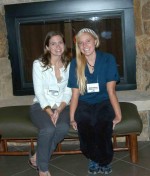LTER graduate students gathered for their third Graduate Student Symposium (GSS) on September 13th, 2009, at Estes Park, CO, before the formal opening of the All Scientists Meeting. Based on student feedback about previous graduate student symposia, this symposium was designed to inform newer students about the general structure of the LTER network, to expose participating students to ongoing LTER social research, and to foster cross-site collaborations among students.
By all accounts, the GSS was a great success. Over 180 people attended, representing all 26 sites, the International LTER (ILTER), the LTER Network Office (LNO) and the National Science Foundation (NSF)
The symposium began with a general introduction of the LTER Network by several speakers-Amber Hardison (VCR), Chelse Prather (LUQ), Bob Waide (LNO), and Todd Crowl and Henry Gholz (both from NSF)-who also described the graduate students' role in the Network. Terry Chapin (BNZ) spoke next, about his successful integration of social and ecological sciences in Alaska, in the process providing a valuable introduction to this year's ASM theme.
Chapin's talk was followed by a selection of current and recent graduate student research talks highlighting collaborative research within the LTER: Marko Spsojevic (NWT) discussed his cross-site dissertation work; Brian Voigt (BES) highlighted socio-ecological research that he is conducting; and Becky Ball (MCM) shared her experience as part of a successful collaboration from a 2006 GSS working group. These speakers did an excellent job of showing students the variety of opportunities for collaboration within the Network.
After lunch, students participated in a careers panel featuring former LTER graduate students representing a variety of career paths, including academia, the private sector, and state and federal government agencies. The expert panel consisted of Shawn Dalton (BES), Stuart Grandy (KBS), Dan Childers (FCE, CAP), Todd Crowl (LUQ), Sherri Johnson (AND), Meredith Knauf (NWT), and John Kominoski (CWT, ILTER). The panelists fielded student questions and shared their unique perspectives on possible career paths after graduation.
The symposium concluded with students self-selecting into eight concurrent student-led working groups to discuss topics for potential collaboration:
- Potential inter-site comparisons of carbon studies in the LTER network
- The impacts of intra-annual precipitation variability on ecosystems
- Comparisons of top-down controls on autotrophic biomass in aquatic and terrestrial ecosystems
- Restoration Ecology & Ecosystem Restoration - What does it mean across LTER sites or projects?
- Identifying the benefits and barriers to graduate student cross-site socio-ecological research in urban systems
- Cross-site discussions comparing the ecological impacts of physical changes in the cryosphere
- Engineering global change experiments
- Integrative understanding and cross-site comparison of socio-ecological research in non-urban ecosystems
All of these working groups were well-attended, and several groups planned to continue collaborating outside of the ASM. Indeed, many students indicated in a post-GSS survey that these working groups were their favorite part of the whole ASM. Among the students who responded to the post-GSS survey, 92% rated their overall experience positively, and we hope that these symposia will continue to bring graduate students closer together at future ASMs.
We would specifically like to thank all of the participants who made this symposium possible, especially the LNO and the GSS planning committee comprised of Luke Cole (VCR), Michele Romolini (BES), Jessica Savage (CDR), and Kirsten Schwarz (BES).
Looking forward, both Chelse and Amber will be graduating soon and rotating out of their positions as Graduate Student Committee (GSC) co-chairs. Therefore, graduate students who are interested in becoming more involved in LTER leadership by taking on the GSC co-chair role are urged to get in touch with Chelse (cprather@nd.edu) and Amber (amber@vims.edu) for more information. We further encourage all grad students to take an active interest and to participate in the GSC elections this fall.
Chelse Prather (LUQ) and Amber Hardison (VCR) are GSC co-Chairs

 Enlarge this image
Enlarge this image

